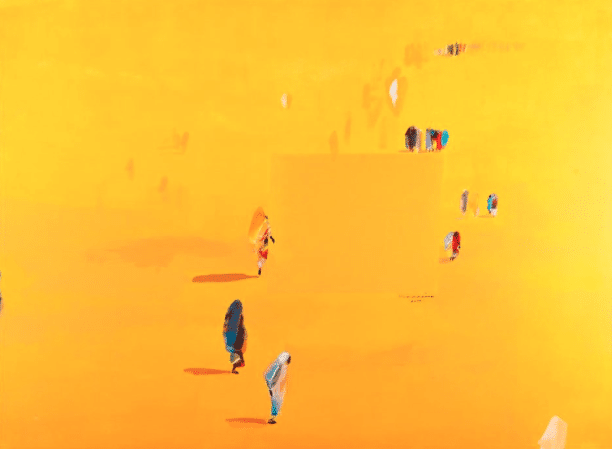Dear friends,
Greetings from the desk of Tricontinental: Institute for Social Research.
One summer evening, the unrelenting sun over Niger refused to dip below the horizon. I sought out some shade with three anxious men in Touba au paradis, a small quiet restaurant in Agadez. These three Nigerians had tried to make the crossing at Assamaka, to our north, into Algeria, but found the border barred. They hoped their final destination would be Europe across the Mediterranean Sea, but first they had to make it into Algeria, and then across the remarkable Sahara Desert. By the time I met them, none of these crossings were possible.
Algeria had closed the border, and the town of Assamaka had become overrun by desperate people who did not want to retreat but could not go forward. These men told me that they fled from Nigeria not because of any physical threat, but simply because they could not make a living in their hometown. High inflation and unemployment made the situation in Nigeria impossible. ‘How could we remain at home’, they said, ‘when we became a burden on our families even after we had finished school?’. Three educated Nigerian men, desperate to earn a living, unable to make one at home, decided against their own wishes to make a potentially fatal journey in search of a way to live with dignity.
I have had this same conversation with migrants on several continents. If the total global migrant population—which was estimated to be 281 million in 2020—could be counted as one country, it would be the fourth largest country by population after China, India, and the United States. Each migrant has a unique story, of course, but some trends are similar. Today, most migrants do not fit the old treaty categories for refugees—asylum seekers escaping persecution on the basis of ‘race, religion, nationality, membership of a particular social group or political opinion’. This definition comes from the 1951 Convention and Protocol Relating to the Status of Refugees, which was drafted in the early Cold War era. Tensions were high at the time, as Western countries made up the majority of the UN. From January to August 1950, the USSR boycotted various bodies of the organisation because the UN would not give the People’s Republic of China a seat on the security council. As such, the convention was based on a Western conception of refugees as people who were fleeing ‘unfreedom’ (believed to be the USSR) for ‘freedom’ (assumed to be the West). There was no provision for the movement of people forced into dire economic straits due to the neocolonial structure of the world economy.
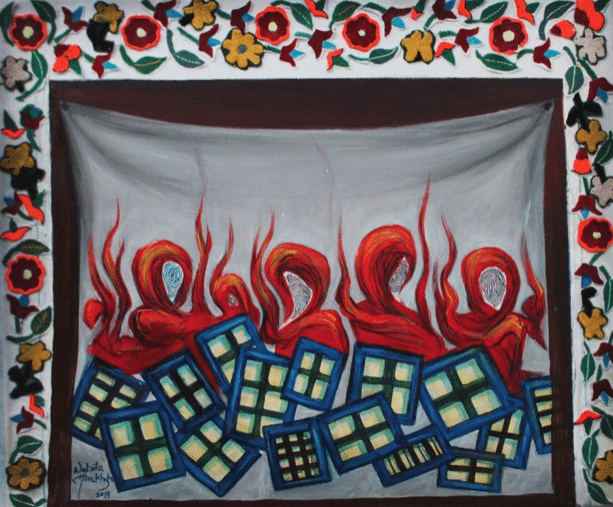
Nabila Horakhsh (Afghanistan), Windows, 2019.
Despite many attempts to redefine the term ‘refugee’, it remains in international law as a term related to persecution and not to starvation. The three men in Agadez, for instance, did not face persecution in line with the 1951 Convention, but they suffered greatly in a country wracked by a long-term economic crisis. This crisis emanated from the following elements: an initial chunk of debt inherited from British rulers; further debt from the Paris Club of creditor countries used to build infrastructure neglected during Nigeria’s colonial past (such as the Niger Dam Project); more debt compounded by internal borrowing to modernise the economy; the theft of royalties from Nigeria’s considerable oil sales. Nigeria has the tenth-largest oil reserves in the world, but a poverty rate of around 40%. Part of this scandalous situation is due to extreme social inequality: the richest man in Nigeria, Aliko Dangote, has enough wealth to spend $1 million a day for forty-two years. The three men in Agadez have just enough money to cross the Sahara, but not enough to cross the Mediterranean Sea. As I spoke to them, the thought loomed over me that they would likely fail at their first hurdle. What lay before them was the struggle to return home, where nothing remained, since they had liquidated all their assets for the failed trip.
Why do these men want to travel to Europe? Because Europe promotes an image of wealth and opportunity to the rest of the world. That is precisely what they kept telling me. The countries of the old colonisers beckon, their cities, partly built on stolen wealth, now attract migrants. And those old colonizers continue to pillage developing countries: the top five oil companies operating in Nigeria are Shell (UK), Chevron (U.S.), TotalEnergies (France), ExxonMobil (U.S.), and Eni (Italy). These old colonisers also continue to sell arms to their former colonies and bomb them when they want to exercise their sovereignty.
In 1996, the Indian writer Amitava Kumar published a poem called ‘Iraqi Restaurant’, which describes a reality that haunts this newsletter:
The Americans turned each home
in Baghdad into an oven
and waitedFor the Iraqis
to turn up as cooks
in the U.S. like the Vietnamese before them.
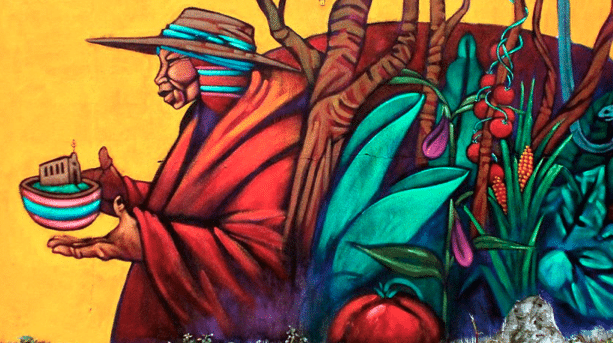
Pablo Kalaka (Venezuela), Pacha en barna, 2016. Pablo is part of the artists’ collective, Utopix, that is celebrating its fifth anniversary!
Lately, I have been thinking of the migrants who are also trying to scale the Melilla border fence between Morocco and Spain, or go through the Darién Gap in between Colombia and Panama, those who are trapped in prisons such as the Manus Island detention centre in Papua New Guinea, or the El Paso Del Norte Processing Centre. Most of them are ‘IMF refugees’, or ‘regime change refugees’, or climate refugees. These are terms unknown in the lexicon of the 1951 convention. A new convention would have to take their existence seriously.
Of the total of 281 million recorded migrants, 26.4 million are registered refugees and 4.1 million are registered asylum seekers. This means that many of the other 250.5 million migrants are either IMF, regime change, or climate change refugees. When the UN’s World Migration Report 2024 notes that ‘the number of displaced individuals due to conflict, violence, disaster, and other reasons has surged to the highest levels in modern-day records’, it refers to these migrants and not strictly to those who are fleeing persecution.
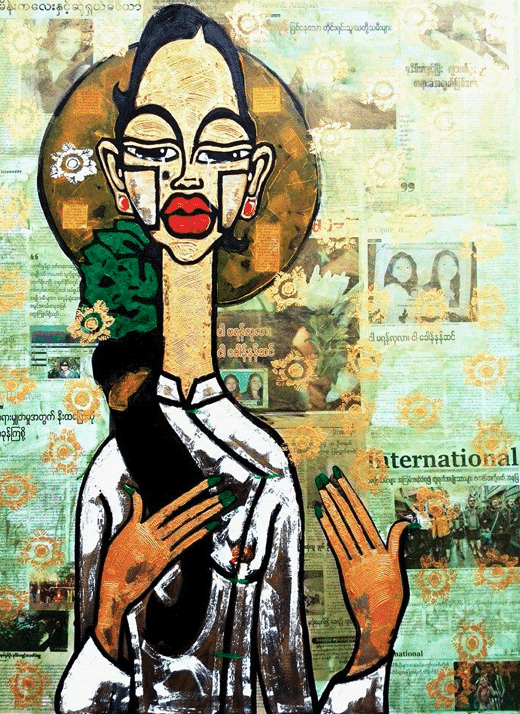
Zwe Mon (Myanmar), A Mother, 2013.
I want to explore the circumstances that create these formally unrecognised refugees in greater detail:
1. IMF refugees
- Almost every developing country was struck by the Third World Debt crisis, exemplified by Mexico’s bankruptcy in 1982. The only antidote available was to accept IMF conditionalities for their structural adjustment programmes. Developing countries had to cut subsidies for health and education and open their economies for export-oriented exploitation.
- The net result was the degradation of livelihoods for the majority, which threw them into precarious occupations domestically and toward dangerous overseas migration. A 2018 report from the African Development Bank showed that, due to the attack on global agriculture, peasants in West Africa have moved from rural areas to cities into low-productive informal services. From there, they decide to leave for the lure of higher incomes in the West and in the Gulf. In 2020, for instance, the largest migrations were to three individual countries (the United States, Germany, and Saudi Arabia), where the treatment that migrants receive is often appalling. These are migration patterns of great desperation, not of hope.
2. Regime change refugees
- Since the fall of the Soviet Union, the U.S. has increased its military and economic force to overthrow governments that try to impose sovereignty over their territory. At present, a third of all countries, especially developing countries, face punitive U.S. sanctions. Since these sanctions often cut off countries from using the international financial system, these policies create economic chaos and bring widespread distress. The 6.1 million Venezuelan migrants who left their country did so mainly due to the U.S.’ illegally imposed sanctions regime, which has starved the country’s economy of vitality.
- It is telling that those with the most vigorously enforced regime change policies, such as the U.S. and European Union, are least charitable to those fleeing their wars. Germany, for instance, has begun to deport Afghans, while the U.S. expels Venezuelans who set up encampments in Juárez, Mexico, out of desperation.
3. Climate change refugees
- In 2015, at the UN Climate Change Conference (COP21) in Paris, government leaders agreed to set up a Task Force on Displacement. Three years later, in 2018, the UN Global Compact agreed that those on the move because of climate degradation must be protected. However, the concept of climate refugees is not yet established.
- In 2021, a World Bank report calculated that by 2050 there will be at least 216 million climate refugees. As water levels increase, small islands will begin to disappear, making their populations survivors of a catastrophe that is not of their making. The countries with the largest carbon footprints bear responsibility for those who will lose their territories to the ravages of the rising seas.
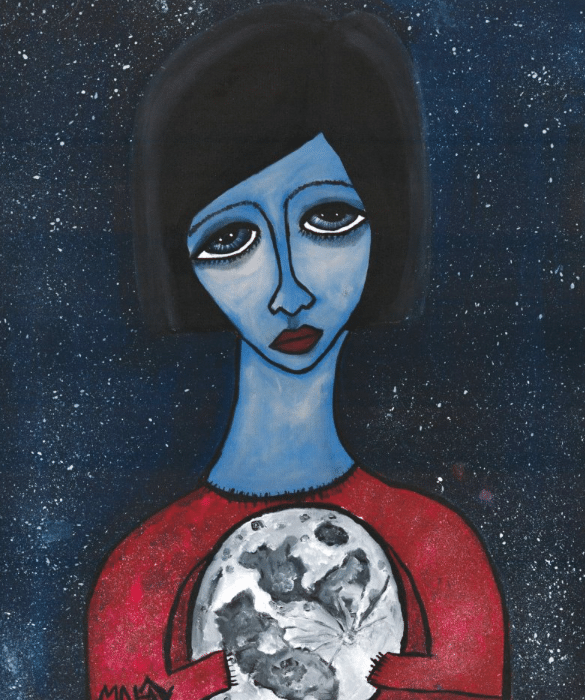
Malak Mattar (Palestine), Electricity, 2016.
No migrant wants to leave their home and be treated as a second-class citizen by countries that forced their migration in the first place (as the Zetkin Forum for Social Research’s report Import Deport: European Migrant Regimes in Times of Crisis shows). Women typically do not want to travel long distances, as the threat of gender-based violence poses a greater risk to them. They would prefer dignity wherever they choose to live. New development policies in poorer nations, an end to forced regime changes that bring war and destruction, and more robust action on the climate catastrophe: these are the best approaches to tackle the enlarged refugee crisis.
A decade ago, the Palestinian poet Dr Fady Joudah wrote ‘Mimesis’, a reflection on just this line of thought:
My daughter
Wouldn’t hurt a spider
That had nested
Between her bicycle handles
For two weeks
She waited
Until it left of its own accordIf you tear down the web I said
It will simply know
This isn’t a place to call home
And you’d get to go bikingShe said that’s how others
Become refugees isn’t it?
Warmly,
Vijay

